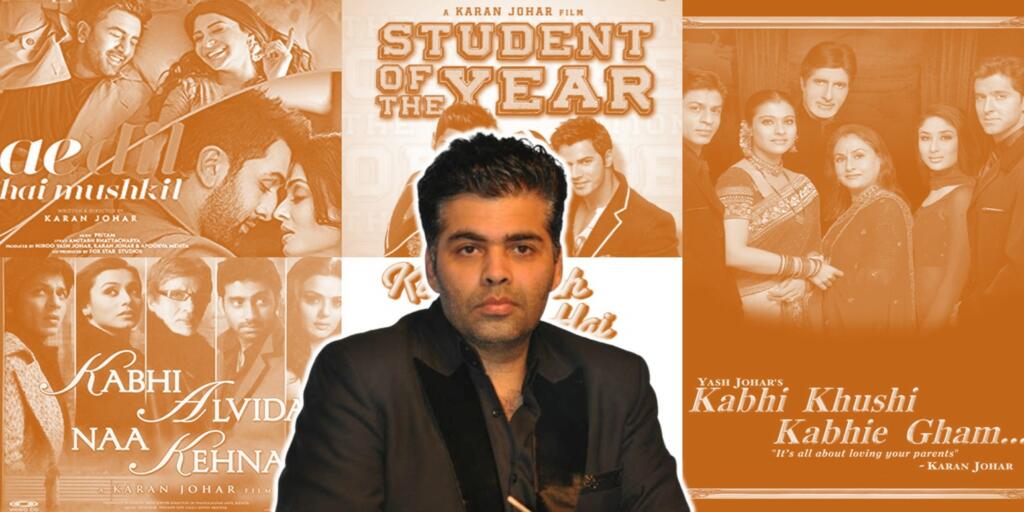The Indian cinema landscape was forever altered in 1998 with the arrival of a fresh-faced director named Karan Johar, who unveiled a melodious romantic drama, “Kuch Kuch Hota Hai.” It was a debut that not only stirred the nation’s collective consciousness but also marked the advent of an era of glamour and gloss, primarily led by Karan Johar.
Let’s look back at his 25-year journey, and would also bring to light as to how, despite the pomp and show, the so-called Bollywood mogul has been anything but a good filmmaker.
Nepotism rocks!
In the grand tapestry of Indian cinema, Karan Johar’s contribution is undeniably significant. However, his path has often been marked with dichotomies. On one hand, he is the man who introduced the concept of high-school romances and large-scale family dramas to mainstream Bollywood. On the other hand, he is also the man who, despite immense resources and creative liberty, has rarely strayed from his comfort zone of predictable narratives and grand visuals.
Also read: Gadar 2: Sunny Deol has a huge legacy to carry forward
This dichotomy was subtly highlighted in 2015 when SS Rajamouli’s magnum opus “Baahubali” shattered the traditional boundaries of Bollywood and regional cinema. Karan Johar, who was the Hindi distributor of the film, found himself in the unusual position of praising another director’s work, while his own craftsmanship remained unheralded. Indeed, for a fleeting moment, Johar seemed to echo a sentiment shared by many in the industry and audience alike – his true talent lied in his strategic acumen and presentation skills, not in creating quality cinema.
Johar’s penchant for strategy and presentation has consistently been evident throughout his career. As the head of Dharma Productions, he has shown remarkable business acumen. He has successfully steered the ship of his production house through the often-tempestuous waters of the film industry, amassing both fortune and influence. However, when it comes to his directorial ventures, well the less said, the better.
Take, for example, his debut film, “Kuch Kuch Hota Hai.” It had all the makings of a blockbuster: a star-studded cast, foot-tapping music, quotable dialogues, and grand set pieces. The formula was a hit, and the film not only rocked the box office but also swept awards, cementing Johar’s position in Bollywood. This pattern was evident in his subsequent films as well, including “Kabhi Khushi Kabhie Gham,” a movie that sold the grand illusion of a castle-like structure situated in the bustling region of Chandni Chowk, Delhi.
All gas, no substance
Johar’s filmmaking prowess, however, is not just limited to creating glossy romantic dramas. He has also dared to venture into uncharted territory with films like “Kabhi Alvida Naa Kehna” and “My Name is Khan.” These films, while they did create a buzz and invited discourse, fell short of becoming the masterpieces they aimed to be. Truth be told, Karan Johar never created films for the entire nation. He had earmarked his audience, and that very thing became both his strength and his weakness.
The underperformance of these films, along with criticism for his style-over-substance approach, led Karan Johar to shift his focus from directing to producing and distributing. He played a pivotal role in bringing the “Baahubali” franchise to a Hindi-speaking audience, a move that turned out to be highly profitable. He continued to produce films, albeit with varying degrees of success. His film “Ae Dil Hai Mushkil,” despite being tagged as mediocre by critics, managed to do reasonably well at the box office, thanks to its high-profile cast and hit music.
Also read: Bloody Daddy review: Did this film really deserve the OTT?
The inevitable decline
However, his strategic move to align himself with high-grossing ventures took a hit when he was left out of the distribution of Rajamouli’s latest venture, “RRR.” The controversy surrounding Johar’s involvement in the mysterious death of Sushant Singh Rajput did the rest. Now, Johar is all set to return to the director’s chair with “Rocky Aur Rani Ki Prem Kahani,” featuring the current industry favourites, Ranveer Singh and Alia Bhatt. Yet, the film’s postponement and the strategic avoidance of a box office clash with “Ponniyin Selvan” continue to reflect Johar’s caution and strategic mindset.
As Karan Johar celebrates 25 years in the industry, it’s imperative to acknowledge his accomplishments. He is undoubtedly a master strategist, a shrewd businessman, and an iconic figure in the Bollywood fraternity. Yet, when it comes to filmmaking, his contributions are often marked by a lack of diversity and depth. His films, while grand and glossy, seldom push the envelope in terms of storytelling or representation. As we observe his quarter-century milestone, one can’t help but wonder what his filmography could have looked like if he had dared to venture beyond the tried and tested more often.
Support TFI:
Support us to strengthen the ‘Right’ ideology of cultural nationalism by purchasing the best quality garments from TFI-STORE.COM
